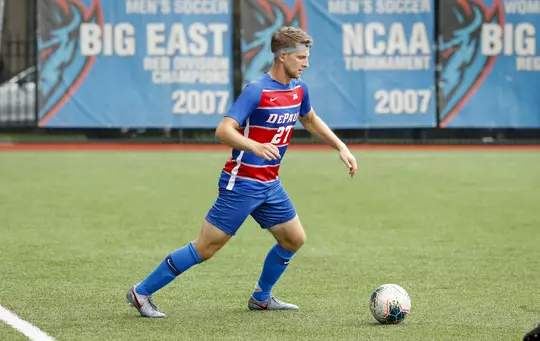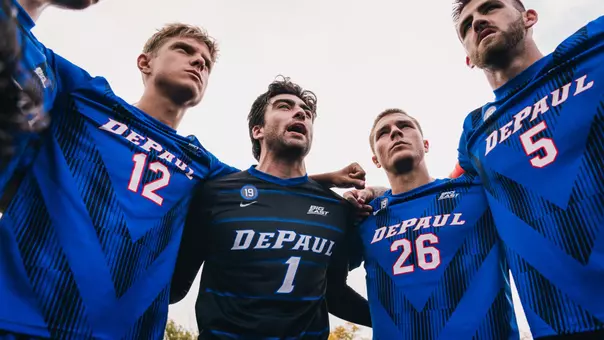
Eddie Perry's Golden Moment
The junior defender was a member of the USA's Pan-Am Games championship team
Claudia Close, Athletics Communications
3/24/2020
CHICAGO - At the tender age of two years old, Eddie Perry’s life changed when he received a cochlear implant and was able to hear for the first time. And two years ago, his life changed again when he became an active team member of the USA Deaf Soccer Men’s National Team.
The DePaul junior never imagined that an article in a Minnesota newspaper would catch the eye of USA Deaf Soccer Association president Tripp Neil who invited him to a team tryout camp in Texas. Perry jumped at the opportunity.

Everything just exploded from there. That was my first experience interacting with other deaf players within the soccer community and it was amazing that they found me just from an article.
"This is such a great opportunity for Eddie," DePaul men's soccer head coach Mark Plotkin said. "Having the chance to compete at the international stage, represent your country, and win a gold medal? It doesn’t get much better than that. Eddie worked extremely hard individually and in team training to prepare himself for this opportunity. Eddie is the consummate professional – our staff and program are so proud of him."
After successfully completing the first camp in Texas, Perry went to camps in Boston and Atlanta. Perry made the 20-man roster for the deaf national team and would soon play a game he would never forget at the 2019 Deaf Pan American Games Nov. 12-15 in Chile.
In order to be an eligible member of the team, players must have a hearing loss of 55 decibels. Not only that, but all players must remove their hearing devices during the match. This wasn't easy for Perry, and it truly made him change his style of play.
"It was definitely different just because I’ve always played with my hearing implant on so when I had the cochlear implant off, I had to definitely look around a lot more,” the Minnesota native explained.
Perry, who can hear about 85-90 percent compared to someone with perfect hearing, resorted to other methods like reading lips and using sign language.
"It was tough at first because I didn’t know much sign language and I couldn’t hear,” Perry said. “When the interpreter and coaches were talking, I tried my best to read their lips, but it was still tough."
Another difficulty of the trip was the grueling schedule. The team was scheduled to play four matches in four days – with their toughest competition on the last day.
The USA delegation played Mexico on the first day, Chile on the second, Brazil on the third and Argentina on the final day---coming away with a sweep against all four teams in the tournament.
Along with being his first taste of international competition, the game against Mexico had a special meaning for Perry.
“Mexico is a big rivalry game because it’s always rough against them – and we won that game 3-2 which was awesome,” Perry said. “I got to start and play in that game. I started and play in all of the games, but that was a big moment for me because that was my debut game and I was super excited about that.”
The team went on to beat host Chile 4-0, Brazil 3-0 and Argentina by a narrow 1-0 score.

“We played Argentina the last day and I was really happy we grinded out a win against them,” Perry said. “We beat a really good team – probably one of the top five teams in the world.”
Aside from this new experience, the style of play was something Perry was looking forward to and noticed it during the match against Mexico.
“It was such a crazy experience,” he said. “Everything was faster, bigger. It’s more physical than I expected, but you can tell they are fully-grown men and you just don’t really get to see that much [in collegiate play]. You just don’t realize how big these players are until you’re out there playing with them.
“It was a crazy experience playing against some of those more physical guys, but I think it definitely helped me develop my game.”
It’s a game that has evolved since he’s been at DePaul, and Perry credits his coaches and the athletic department for the opportunity to go to Chile and be a part of something so special.
“I’m thankful DePaul allowed me to have the opportunity to go down there and play with the team,” Perry said. “It’s the first time in 30 years that USA deaf soccer has won a first-place medal. It was an honor for me to be a part of that team, that history and have that be my first international tournament.”
DePaul really prepared him for the skills and fitness aspect of the tournament.
The high speed we play at DePaul, the players around me and the coaching definitely prepared me because those guys in Chile were grown men. The toughness, the guys on our team and the physicality definitely helped me prepare.
“If you’re not fit, it’s tough to play down there, so I definitely have to thank DePaul, my teammates and the coaches. They helped me out and it has been a wonderful experience. Our strength coach Alicia Zamora has been wonderful over the last two years. She’s helped me develop and get stronger, faster and more fit.”
Perry realizes how special and unique this opportunity was – not only with soccer but also for the deaf community. The interactions he had with other players during the match and afterwards really made an impression.
While the USA team talks more and uses lots of visuals, the other teams relied more on sign language.
“I was blessed to have the opportunity to go down to Chile and experience the culture and environment while playing soccer,” Perry said. “But the biggest thing for me was interacting with the deaf culture from different countries. The language is different, so it was unique and different to see the teammates interacting with each other.
“When we played against Chile, the captain and some of the guys were signing most of the game and we were just playing the game. All in all, everyone enjoyed each other in the end and it was really good to meet everyone.”
He packed away those memories and experiences, returning to the DePaul men’s soccer program as a 2019 Pan-American champion. While playing with his teammates isn’t as easy for him, his coaches and teammates do whatever they can on the field to support him.
Plotkin knows that Perry is doing his part in growing the US Deaf National Team program and will continue to be a trailblazer for young student-athletes just like him.
"Eddie has a wonderful platform as a Division I student-athlete at DePaul University," he said. "We will do everything we can to support him and the USDNT on their road to the World Cup and continue to share his story."

Plotkin along with assistant coaches Tyler Keever and Cole Bushue use plenty of visuals with their hands to signal something Perry might not be able to hear them yell out.
“Plotty is always trying to make sure he faces frontwards with me,” Perry explained. “It’s my job, too, to face front and make sure I’m listening. It’s a 50-50 responsibility. I have to make sure I’m in a spot to hear him, Keever and Cole.
“I’m glad those guys gave me the chance to go to Chile and prepared me so well.”
As for what’s next for Perry, the USA Deaf Men’s National Team qualified for the 2020 Deaf World Cup Sept. 9-24 in South Korea and Perry is itching to go. But while he is looking forward to that, he holds onto the memories he made in Chile.
“Winning the last game was the biggest moment,” he said. “We ran around the field super excited because it’s never happened before. I probably won’t experience that feeling for a while unless we do well in South Korea. But being in that moment was amazing.”




